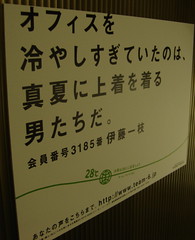Japan is infamous for the careful attention it pays to its national image. As a result, some interesting semantic situations can arise. For example, the Japanese media will often try and introduce a Japanese word into the English language in order to put a Japanese spin on a certain issue. Case in point: in February the Kenyan Deputy Minister of Environment’s official visit to Japan held a surprise for PM Koizumi (found via FG):
Last Friday, I met with Professor Wangari Maathai, Kenya’s Deputy Minister of Environment…Prof. Maathai told me how during her visit to Japan she had learned the word “mottainai,” which could be literally translated as “don’t waste what is valuable.” I completely agree with Prof. Maathai on the importance of this concept of “mottainai.” I had thought that it was a concept that foreigners would not fully be able to grasp, but as I listened to Prof. Maathai I realized that I too should do my best to spread this “mottainai” spirit around the world.
However, one poster to the FG forum had something interesting to say about the incident:
This “mottainai” caper has me baffled.
I was at the interview with Maathai hours after she first arrived here. Earlier in the day, I had been asked about “mottainai.” When it came up in the interview, the interpreter used the word “wasteful” (correctly), even though the interviewer had strongly pressed Maathai to use “mottainai.” When Maathai replied, she used “wasteful.” She was then whisked away to another room and I returned to my office to write the story. I received a message that I had to use the word “mottainai” in the lead, even though what she’d had to say about waste was among the least interesting parts of the interview.
I notice every environment story Kyodo is putting out on the environment features the word “mottainai.”
Apparently, the Environment Agency is putting pressure to have the word become widely used in English. It’s not a particularly effective replacement for “waste,” which I think does a fine job in English. My personal opinion is the Environment Agency should worry more about protecting the environment than try to force a new word into the language, which will probably include more pressure on ODA recipients.
It seems the government was putting words in the Deputy Minister’s mouth! I read this and thought little of it until I read an interview with famous Japanese architect Shigeru Ban and HE USED IT TOO!
For his part, Ban says: “I always thought architecture had to be respected. We have the power and the skill.”
Ban worries about waste.
“Mottainai,” he said suddenly, grabbing a reporter’s notebook to write the word. The Japanese expression means something is too good to waste. It is as close as he would come in an hour of conversation to explaining what motivates his work.
He was giving the reporter a tour of the 45,000-square-foot Nomadic Museum on a frigid day last month. Jet-lagged after a flight from Tokyo, he nevertheless was eager to explain his Nomadic design.
Despite being less than talkative at the interview he at least knew the right buzzword to say.
Now let’s look at this Al-Jazeera report which expresses sour grapes over the positive portrayal slain mercenary Akihiko Saito got from the Japanese media:
Japanese media glorifies Iraq hostage
The abduction of Akihiko Saito in Iraq after an ambush on 5 May has sparked an entirely different reaction to the one that greeted the three Japanese who were taken hostage there one year ago.
While Saito, an armed private security officer, has been treated with respect and admiration at home, the two humanitarian workers and a photojournalist were subjected to a sustained attack on their actions, motives and personal lives.
When Noriaki Imai, Nahoko Takato and Soichiro Koriyama returned to Japan this time last year after their hostage ordeal, there were no celebrations and certainly no hero’s welcome.
They were criticised for their stupidity for being in Iraq, the wasting of government money on efforts to secure their release, and dirt was dug up on their families and backgrounds.
True enough. But what’s interesting is their analysis of the language gap in covering the story:
There has been much talk of the large salaries paid for this kind of work as well as the high level of skill and experience required.
The Japanese media has been happy to use the term “youhei”, which translates as “mercenary” or “hired soldier’, to describe Saito, although the image conveyed has been of an exciting and glamorous world.
Interestingly, in the English-language Japanese media, the word “mercenary”, with its negative connotations, has been avoided.
There is a belief in some quarters that the presence of Saito in Iraq helps to legitimise the activities of the Self-Defence Force (SDF), whose members are engaged mainly in guard duties in the most active deployment of Japanese troops since the pacifist constitution was imposed by the US after WWII.
Doshisha University’s professor Watanabe says the Japanese government has been keen to show Saito in a positive light as if he has been working for the security of Japan itself.
Not exactly an easy message to swallow coming from al-Jazeera (I’m sure they’d support mercenaries for the other side), but I’m always fascinated with the subtleties of characterizations like this.




 (More Cool Biz goodness at
(More Cool Biz goodness at 






